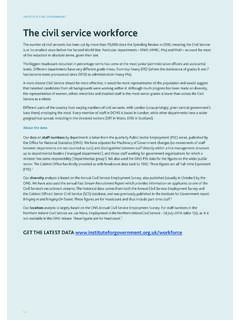Transcription of The Privatisation of British Telecom (1984)
1 The Privatisation of British Telecom (1984). Starting point Privatisation became one the defining policies of the Conservative Party's eighteen years in power between 1979 and 1997. Yet it was barely mentioned in the 1979 Conservative general election manifesto and the new government's first budget speech contained only an oblique reference to shrinking the state. As Margaret Thatcher reflected in her memoir, since now almost universal lip service is paid to the case for privatization it is difficult to recall just how revolutionary how all but unthinkable it seemed at the end of the 1970s.
2 1 Such unthinkable policy solutions only found favour due to the growing perception that the persistent economic performance problems in the public sector required radical remedies. This case study looks at the ways in which bold and untested proposals were turned into successful policy. Policy background Although Privatisation has a number of potential meanings, the sale of publicly owned assets (otherwise known as denationalisation) became almost synonymous with the use of the term as applied in the UK. Nigel Lawson recalled that most of us felt denationalization did not sound positive enough and therefore the process came to be officially described as This usage was an invention of David Howell (Secretary of State for Energy, 1979-81, and Secretary of State for Transport, 1981-3) and seems to have gained favour simply through the lack of a better alternative: It is an ugly word and Margaret disliked it so much that for some time she refused to use it.
3 But none of us could come up with anything better .3 In its broader conception, Privatisation also signalled a change in the relationship between the state and business, as well as the deregulation, liberalisation and the introduction of competition into formerly publicly owned industries. One of the key aspects of the debate on the origins of Privatisation is to what extent it was planned in advance by the Conservatives while in opposition. Many of those from the time saw little evidence of planning for Privatisation .
4 At our policy reunion, John Wakeham recalled that the economist Stephen Littlechild deleted a chapter on Privatisation from a book, which he wrote on options for a future Conservative government in 1978, because he feared including it would mean 1. Margaret Thatcher, The Downing Street Years (London: HarperCollins, 1993), p. 677. 2. Nigel Lawson, The View from No. 11: Memoirs of a Tory Radical (London: Bantam, 1992), p. 198. 3. Ibid. 45. the book would not be taken The focus of the 1979 manifesto was on controlling money supply, reducing public expenditure and cutting tax.
5 Yet, while it did not outline a programme of widespread Privatisation , the manifesto did promise to sell back to private ownership the recently nationalized aerospace and shipbuilding concerns, giving their employees the opportunity to purchase shares , as well as selling off shares in the National Freight Corporation to the general public .5 Many commentators have concluded that denationalisation came about either largely by accident or as a policy emerging through trial and error. According to James Foreman-Peck, in the late 1970s Privatisation was scarcely even a gleam in the minister's eye.
6 6 Andrew Gamble has described the eventual policy making process as a series of ad hoc decisions and experiments that were given retrospective justification and coherence by government ministers .7. However, one of the architects of the policy process, Nigel Lawson, has rejected these interpretations: They could not be more mistaken. 8 Although admitting that little detailed work had been done in opposition, Lawson explained that the reluctance to go public with these plans was the result of chiefly Margaret's understandable fear of frightening the floating voter and he remained adamant that privatization was a central plank of our policy right from the start.
7 9 Other accounts suggest that a certain amount of work had been done even before the Heath government a decade earlier. A denationalisation group had worked through the Conservative Research Department and a study was prepared on the potential for such a However, these proposals did not make it into Heath's already very full programme. Whatever its exact origins, the ultimate form of Privatisation adopted under Thatcher evolved as initial successes spurred on grander initiatives. After winning the 1979 election, the Thatcher government was determined to introduce a raft of reforms that would restructure the economy, roll back the state, and redefine the relationship between the public and private sectors.
8 This radical agenda had been generated in direct response to the failure of previous regimes, but it also responded to a growing disenchantment with the mixed economy of the post-war settlement. Andrew Gamble has suggested that the new direction of the Thatcher government was possible because by the time it took office so many of the policies and ideas associated with the 1940s had been discredited .11 As the government pushed through measures to boost economic performance, reduce dependency on the welfare state and limit the power of public sector unions, post-war political consensus gave way to an increasingly adversarial 4.
9 Institute for Government, Policy Reunion on Privatisation (24 November 2010); details available at: 5. Conservative Party General Election Manifesto (1979), available at: 6. James Foreman-Peck, How Privatisation Has Changed Britain', BBC (3 December 2004), available at: 7. Andrew Gamble, Privatization, Thatcherism, and the British State', Journal of Law and Society, vol. 16:1 (Spring, 1988), p. 7. 8. Lawson, View from No. 11, p. 199. 9. Ibid. 10. Brendon Sewill, Policy-Making for Heath', in Alistair Cooke (ed.)
10 , Tory Policy-Making: The Conservative Research Department 1929-2009 (Conservative Research Department, 2009), p. 61. 11. Gamble, Privatization, Thatcherism, and the British State', pp. 2-3. 46. relationship between reformers and defenders of the status quo. In particular, the key tenet of the New Right strand of Conservatism, which developed during these years, held that the market was the best way to organise economic activities since it provides financial constraints and incentives that reduce waste and inefficiencies.














